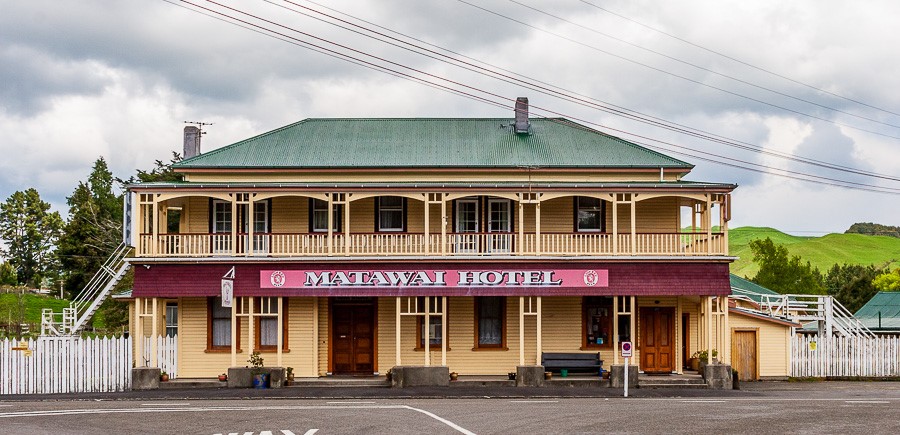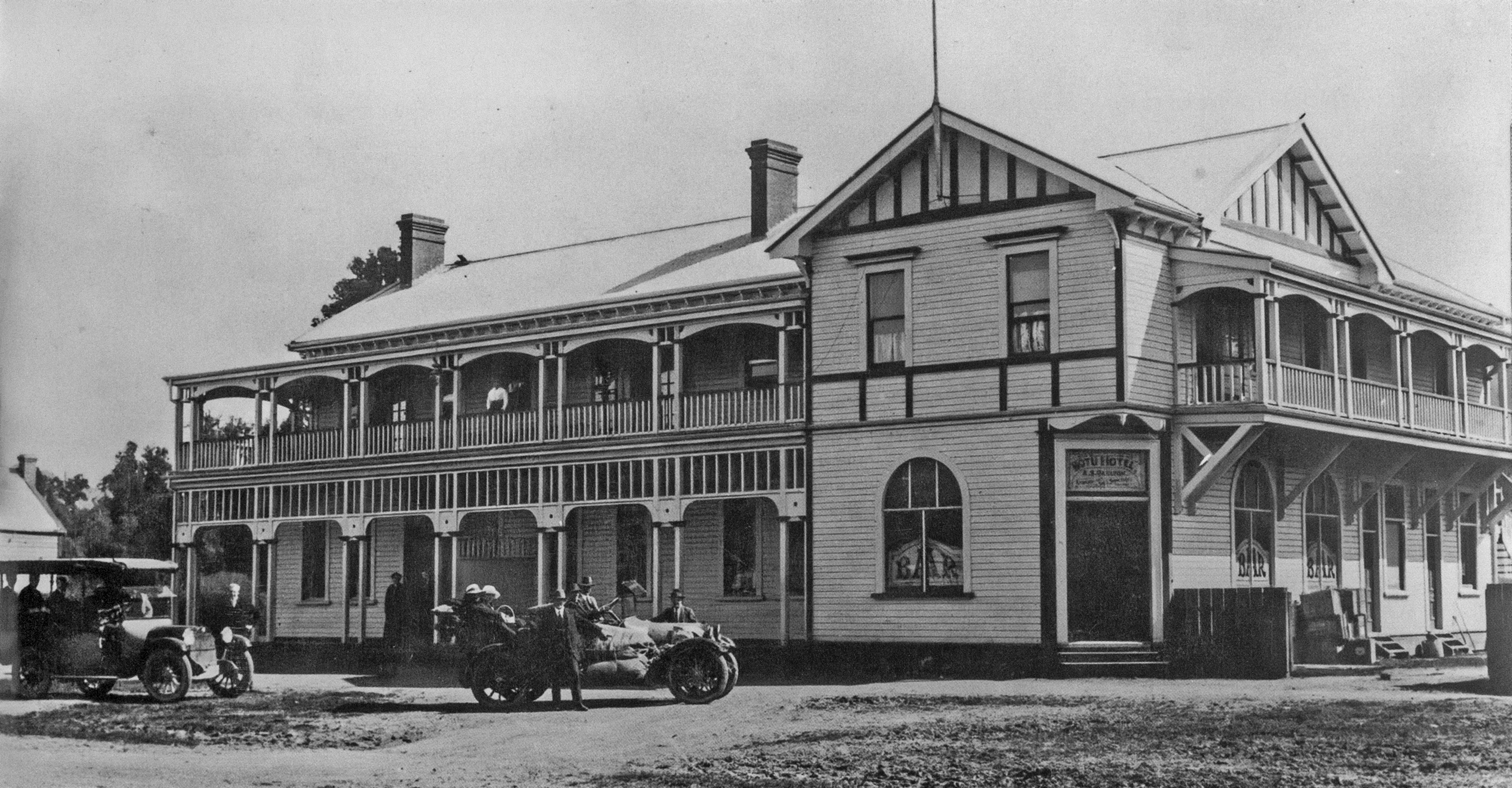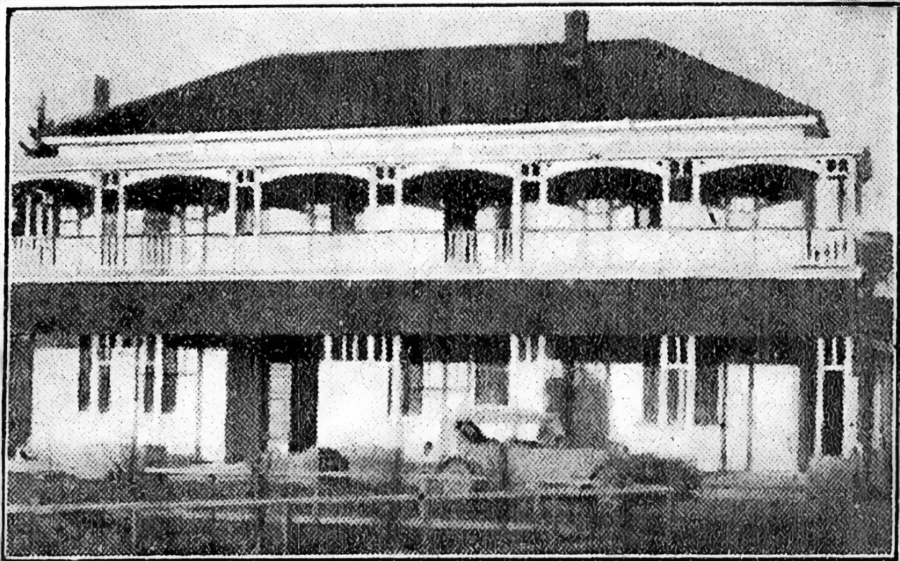 Chris Korte's New Zealand Genealogy Project
Chris Korte's New Zealand Genealogy Project
History of Matawai, Gisborne, New Zealand
Information about Matawai, near Gisborne NZ, and its history. The Korte family were among the first settlers in the district.
|
| « page Index . . .10 11 12 13 14 . . .17 page » |
Hotel
The Matawai Hotel opened on 11 July 1934, but was originally part of a larger hotel at Motu. A photo of the Motu Hotel is shown below. Until the road between Matawai and Opotiki through the Waioeka Gorge was opened, the main road from Gisborne to Opotiki and Auckland was through Motu. The Motu Hotel's trade declined significantly with traffic going through Matawai instead of Motu, the decline being sufficiently significant that the Bay of Plenty Licensing Committee reduced the license fee for the Motu Hotel from £15 to £5 in June 1931.
Reginald Stapleton Caulton, owner and licensee of the Motu Hotel, asked to move his hotel from Motu to Matawai (about 9 miles). At the time, licensing laws prevented a country hotel being moved more than a mile, and parliament had to approve the move. Below are newspaper reports of legislation to allow the transfer of the hotel and licence, a report on the plan for the Matawai Hotel, and a report published when the hotel opened. Part of the Motu Hotel building was moved to Matawai in 38 lorry loads before being reconstructed. When the Matawai Hotel opened Reg Caulton was the licensee and his wife and married son Glen Caulton also worked in the hotel.
The Matawai Hotel had seven upstairs rooms, five single and two double, an annexe that slept four, seven drovers cottages and three bedroom owners accommodation. There was also a public bar, a kitchen, a large dining room and a number of ancillary rooms that could be used for small functions or for an overflow of late night guests. Most of the out-buildings have now been demolished.
When first built the hotel was a popular meal and accommodation place for travellers between Gisborne and Opotiki, the journey taking several hours, and the roads being closed unexpectedly by slips in wet weather. With improvements to the highway and reduced travel times, the need to provide accommodation for travellers at Matawai declined. The Hotel bar was also popular with district residents. In the 1970's the Hotel collected and displayed in the bar an impressive collection of memorabilia and historic images reflecting the districts saw milling history. The hotel is now (2017) closed for business and the building is a private residence.

Matawai Hotel, 2005.

Motu Hotel, built in 1914.
The wing on the left of the photo became the Matawai Hotel.
Source: The Motu and Beyond - The Way it Was, Dick Twisleton 2007.

27 November 1933, Page 4.
THE TRANSFER OF THE MOTU HOTEL.
The decision on the part of the House of Representatives to permit the removal of the Motu Hotel to Matawai was generally anticipated, but the fact that, on the only division called for, the measure found only seven opponents must have come as a pleasant surprise to those concerned. As is well-known, when the new main northern outlet via Matawai was constructed, the hotel in question was side-tracked by several miles and, as, under the present law, an hotel cannot be removed a greater distance than one mile in a rural area, it became necessary to promote a local Bill to enable the Licensing Committee to remove the hardship which had been created.
The fact that almost unanimity was displayed in favour of the request in the "People's Chamber" is, of course, proof that the request to remove the hotel was founded on fair and sound lines. It may also be said that the decision was a graceful tribute, to the tactful manner in which Mr. K. S, Williams, the member for the Bay of Plenty, guided the Bill in its passage through its various stages. Mr. Williams was, no doubt, fortunate in that the case which he had to present was so extensively supported outside the political arena.
Not only had it the support of the Bay of Plenty Licensing Committee, but it also had been commended by the late Mr. P. H. Harper, S.M., the police authorities, the A.A. and the Chamber of Commerce and, what is more, there was no concerted objection on the part of the residents of the district affected.
Such a state of affairs could lead only to two conclusions: (1) That an hotel is needed at Matawai and not at Motu; and (2) that the proprietor, Mr. Reg. Caulton, has earned an enviable reputation in the role of "mine host" in the Motu district.
As there may be some other hotels in a like predicament, it would be only right if the Government also granted facilities for the removal of hardships also in their eases. Strange as it may appear, one of the arguments used against the measure under consideration by its negligible band of opponents was that to pass it would be to create a bad precedent. Such a suggestion amounted to a reflection upon the intelligence and capacity of Parliamentarians. In this connection, it was very properly stressed by Mr. Williams that any future cases would also require to be dealt with upon their merits. It is indeed, difficult to believe that even the handful of members who voted against the second reading of the Bill were personally opposed to the principle of a district having hotel accommodation where it is required. Maybe, they imagined that the measure might prove to be the thin end of a wedge to bring about radical alterations in the Dominion's licensing laws. If, however, those particular laws are in need of amendment — and there are many who hold that viewpoint — why should the Government hesitate to bring down a policy measure on the subject? It amounts to an extraordinary condition of things that successive governments have, apparently, been afraid to bring down amendments to the Licensing Act. Usually, the excuse has been that the subject is a most contentious one and that it would he better to allow even anomalies to remain than to bring down a series of much-needed amendments. In this connection, the framers of the Bill under notice took a decisive step.
As the question was made the subject matter of a Local Bill and it dealt with only one point, it was not open to members to discuss any other aspect of the Licensing laws. All that was required of them was to approve or reject the principle which it involved. What seems to have impressed itself forcibly on most of them was that the state of affairs complained of could not have been foreseen by the framers of the original law.
The road deviation, it will be agreed, was in the public interest, and it follows that it was only right and proper that the hardship which was inflicted in connection with the hotel should be removed, and more especially seeing that the residents of the district hold that it would also be in the public interest if the hotel were moved to a site where it would be of real use.

13 December 1933, Page 4.
MOTU HOTEL
REMOVAL TO MATAWAI
BUNGALOW TYPE OF BUILDING
As a sequel to recent legislation power has been granted the Bay of Plenty Licensing Committee to authorise the transfer of the Motu Hotel to Matawai. This alteration, as is well-known, is necessitated by the fact that practically all the traffic north now cuts off at Matawai, proceeding to Opotiki by the Waioeka road, which is a much shorter route. The transfer of Mr R. S. Caulton's well known hostelry will give satisfaction alike to the travelling public and to the residents of the district, and there is no doubt whatever that the move will be a most popular and profitable one.
The hotel will be erected at the corner of the main north road and Waioeka road. The building lends itself admirably to removal in sections and this will greatly assist in the reconstruction programme.
The new building will be of bungalow design, of a very attractive type. The main entrance will be approximately in the same position as that of the present hotel, in relation to the general lay-out of the structure, but experience gained in practically a life-time of hotel-keeping on the part of Mr Caulton will be embodied an the interior design of the premises. A spacious morning room will furnish facilities for through travellers who desire quick service with breakfasts or morning teas, and a commercial room, office, and sitting room will occupy the other side of the entrance. The bar arrangements will represent a distinct advance on the present hotel layout and will include a parlor with a substantial fireplace, communicating with the service bar. The dining room and kitchen accommodation will be similar to that in the old hotel and private quarters for the licensee and his family will be located in a small wing on the right hand of the main entrance. Upstairs accommodation will include a private sitting-room and a number of bedrooms, while for drovers and others who prefer self-contained quarters there will be well-designed accommodation in a separate building.
A typical example of the detail in which the comfort of the travelling public has been studied will be seen in the location of the building. The hotel will be placed well back, on an angle facing the corner. Between the highways and the building a broad drive will run, parallel to the frontage. Near the entrance a substantial portico will be erected, leading into the hotel. Thus in wet weather patrons desiring refreshments will be enabled to alight from the cars under the portico and proceed straight into the hotel. The corner section thus cut off and facing the two roads, will be laid out in garden plots and a rockery, which should present a very attractive spectacle.
Tenders for the work of removal from Motu and reconstruction at Matawai will be called by Messrs Birr and Mirfield in the very near future.

11 July 1934, Page 9.
CHANGING HIGHWAYS
TRAVELLING AMENITIES
MATAWAI HOSTELRY
OFFICIAL OPENING TO-DAY
The fulfilment of years of work, in the opening of the hotel at Matawai, at the junction of the Waioeka and Motu roads, was marked to-day by the visit of the Bay of Plenty Licensing Committee to the little hill-country centre for the final inspection of the building and its equipment. The committee had previously approved of the transfer of the license from Motu to Matawai, under the legislation passed by Parliament during last session to meet the particular case of the Motu Hotel, and the plans of the Matawai building had been likewise approved, and there was no occasion to anticipate any hitch in connection with to-day's inspection.
Though the actual process of transfer of portions of the old building from Motu, and their re-erection on the Matawai site, has been a matter of a few weeks only, the story of the effort to secure permission for the removal of the license goes back at least two or three years. Even before the opening of the Waioeka route through the ranges dividing Poverty Bay and the Bay of Plenty, it was realised that the work on this route would eventually endanger the custom of the Motu Hotel, and in later year's it became evident that not only the custom of the hotel but also the convenience of the travelling public was to be affected by the diversion of traffic from the old road.
In the efforts made by local interests to secure a change in the licensing legislation, in order to permit the transfer of the license from Motu to the junction of the two roads at Matawai, emphasis was laid upon the matter of public convenience, and it was this aspect of the question, first represented Officially by the Bay of Plenty Licensing Committee and later by the Automobile Association and other semi-public bodies, that finally secured recognition from Parliament. Last session Parliament made an amendment to the Licensing Act empowering transfers of licenses where district boards were assured that the public interest would be better served, for distances beyond the maximum previously laid down.
A NEW PHASE OPENED.
The case of the Motu Hotel thus marked the beginning of a new phase of the licensing question in New Zealand, and though the building at Matawai is not the first to be opened as a licensed house under the new regulation — the Te Puia Hotel was opened last week under a license which had been transferred from Tuparoa — it will stand for many years as a reminder of the occasion on which Parliament first took into consideration the changing characteristics of New Zealand's highway system in relation to the question of travellers' comforts.
For many travellers, too, the new building at Matawai will always have its associations with the days of Motu in its prime. These passers-by will remember times, perhaps, when the hotel at the Motu River crossing was filled to overflowing with transient guests, to whom the passage between Gisborne and Opotiki was more than a matter of a few hours comfortable riding in balloon-tyred cars. There will be some among the elders who will even remember the days of Mr Christian Hansen, founder of the village of Motu, and keeper of the first accommodation house on the Motu block.
The story has already been told in the Herald's columns of the coming of Mr Christian Hansen, as a member of a small troop of East Coast Hussars who had been to Opotiki in connection with the apprehension of Te Kooti. It was in 1887 that this party camped on the banks of the Motu River adjacent to the site of the township, and Mr Christian Hansen, looking about him at the fine timber growing in the locality, determined to settle there. He later bought the Motu township site from the Government, one of the conditions of the sale being that he would open an accommodation house for the travelling public. The first accommodation house was a rough shack, but after a year of occupation Mr Hansen was ready to build anew. He had timber sawn in the pit, and iron for his roofing had been brought by pack horses from Gisborne, under conditions of hardship such as were the accompaniments of all back block endeavor in the young colony.
BUILT 1890 — GOING STRONG.
In 1890 Mr Hansen was the possessor of a more commodious building, and in to-day's issue will be found a reproduction of a photograph taken of this building a few years later. This building is still in use at Motu, and during the heyday of the Motu Hotel it was the well-known annexe in which holiday guests were accommodated when other space was full. It stands as a remarkable tribute to the work of its builders, having withstood the effects of the elements for well over 40 years, with little apparent deterioration.
In 1906 Mr Christian Hansen retired from business as a hotel keeper, and his son took over the hotel, in partnership with Mr W. Bright. Within three years, the elder Mr Hansen died at Motu after an operation performed by a doctor who travelled from Gisborne over an almost impossible road. His widow survives to this day, and at the age of 64 years vividly recalls the incidents of her early association with the township of Motu. The building of what was known as the new hotel was undertaken in 1914 by Mr Alexander Caulton, who had purchased the business in 1909. The flow of traffic along the Motu route between the Bay of Plenty and Poverty Bay was constantly increasing, and at one time there were three sawmills, each employing large staffs, in full swing close to the hotel site, and there was also the prospect of an early connection with the railway, which was then advanced as far as Motuhora. Two bank branches and stores helped to swell the business volume and population of the township, and Motu certainly presented a thriving appearance in the years immediately prior to the war. But with the cutting out of the hush, and the transfer of milling activities to other neighborhoods, together with the fading of the railway prospects, the village lost its old time vim, and when the new road through the Waioeka was opened for general traffic, the death-knell of Motu was heard.
So followed the agitation to have the hotel license transferred to Matawai, and the eventual success of that agitation. To-day the one-storey building erected by Mr Christian Hansen in 1890 is all that remains on the site of the old Motu Hotel, and the license rests in the handsome and convenient new structure at the Matawai junction. Designed on the most modern lines, this building should serve the travelling public for many years without addition: and it will be heard with pleasure by the many friends of Mr and Mrs Reg. Caulton that they intend to maintain their connection with the hostelry.

THE NEW HOTEL AT MATAWAI.—Comprising the major portion of the Motu building transferred and re-erected at the junction of the old Motu road and the Waioeka route.
Page Updated 7 Jan 2024
| Owner of original | Chris Korte |
| File name | histories/./folio/placesMatawai/12 Hotel.html |
| File Size | 17.75 KB |
| Media ID | 10262 |
| Dimensions | n/a |
| Folio version | v13.0.0.37 (B241124-155513) |
| Linked to | Althea Grace Elizabeth MORTLEMAN; Herman BULST; Felix Herbert BUSCKE; Heinrich Friederich Johann KORTE; Christopher John KORTE; Arthur Edward MORTLEMAN; Elizabeth Ann FLEMING; Elizabeth Mary REDPATH; George REDPATH |
| Back to top « page page » |








